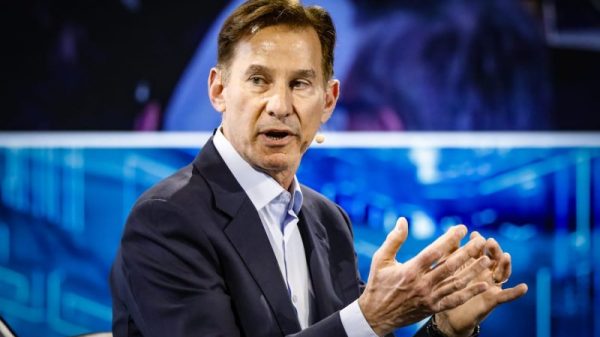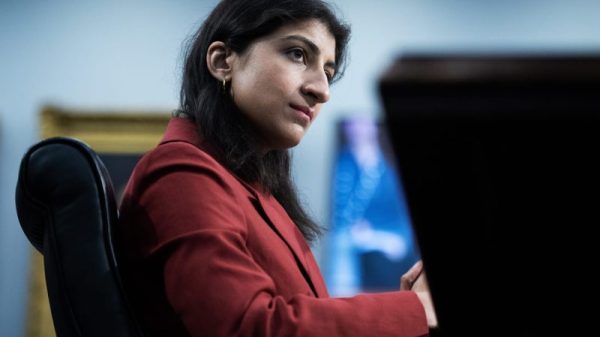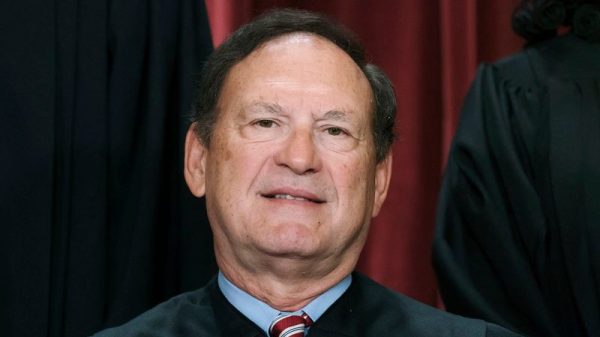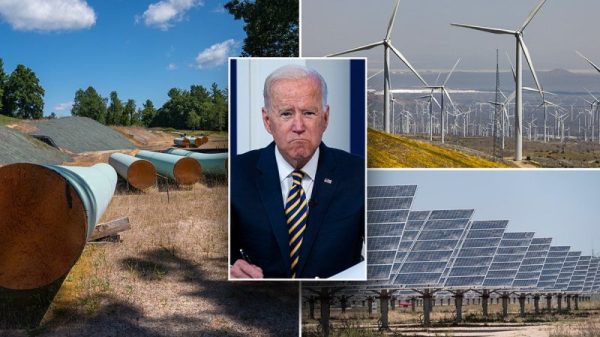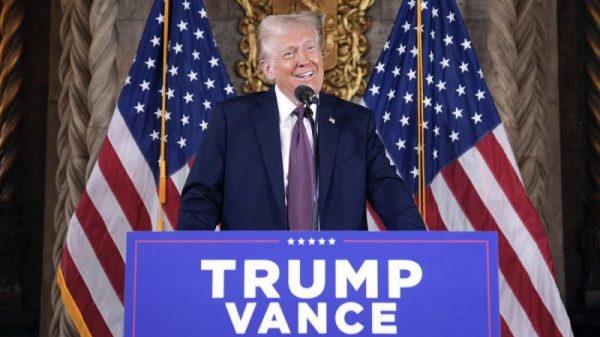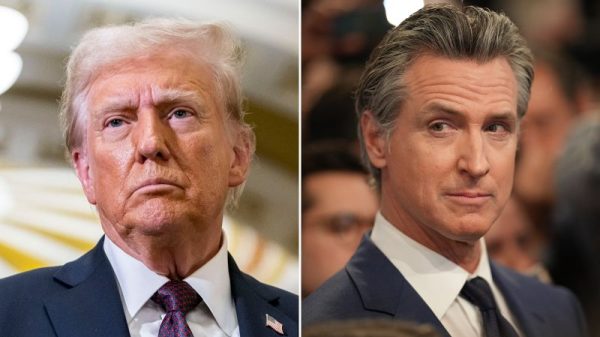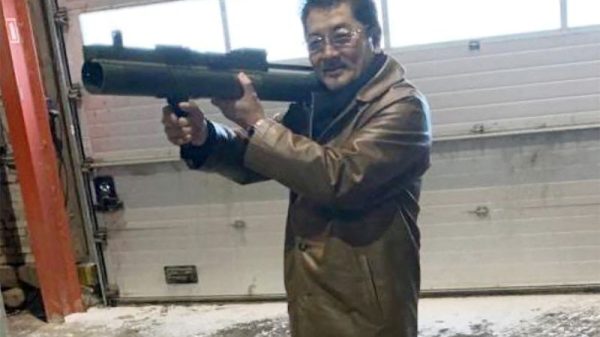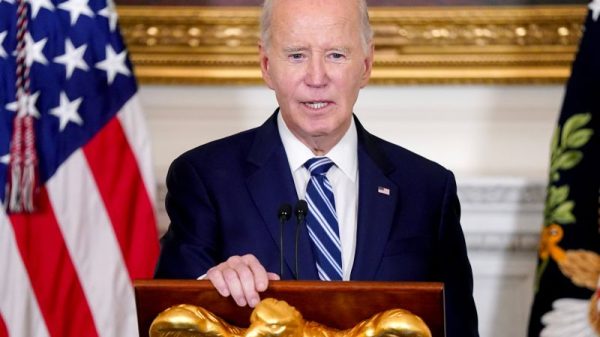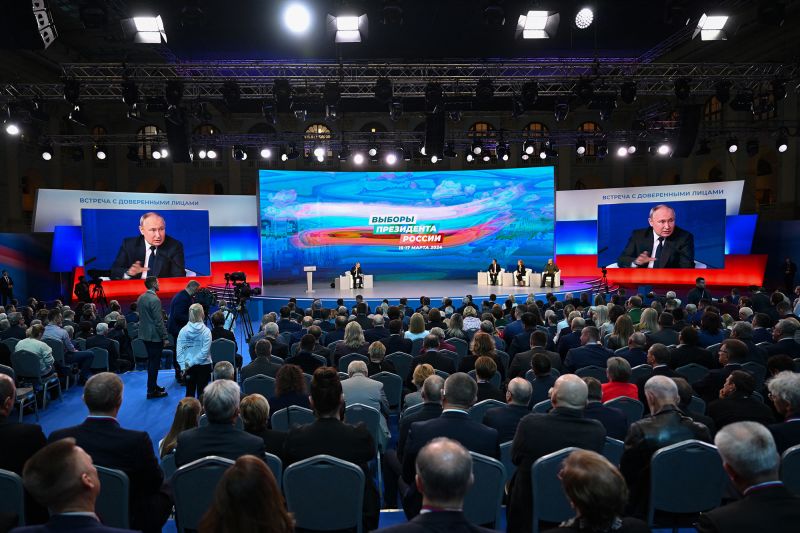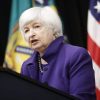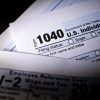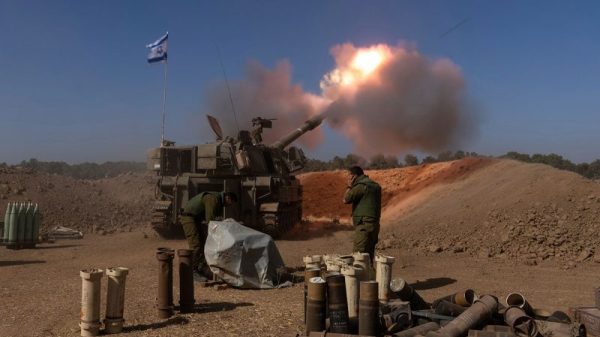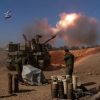Russia is nearing a presidential election that is all but certain to extend Vladimir Putin’s rule throughout this decade and into the 2030s.
The vast majority of votes will be cast over three days from 15 March, though early and postal voting is expected to take place sooner, including in occupied parts of Ukraine where Russian forces are attempting to exert authority.
But this is not a normal election; the poll is essentially a constitutional box-ticking exercise that carries no prospect of removing Putin from power.
The president’s dominance over the Russian electoral system has already been reinforced as the election looms. The country’s only anti-war candidate has been barred from standing, and Alexey Navalny, the poisoned and jailed former opposition leader who was the most prominent anti-Putin voice in Russia, died last Friday.
Here’s what you need to know about the election.
When and where will the election take place?
Voting will be held from Friday March 15 until Sunday March 17, the first Russian presidential election to take place over three days.
A second round of voting would take place three weeks later if no candidate gets more than half the vote, though it would be a major surprise if that were required. Russians are electing the position of president alone; the next legislative elections, which form the make-up of the Duma, are scheduled for 2026.
Early voting has already begun in hard-to-access areas, with approximately 70,000 people able to case their ballots in remote areas of Russia’s Far Eastern Federal District, according to state news agency TASS. The region makes up more than a third of Russia’s total territory but has only about 5% of its population.
In early March, voting will be expanded to the parts of Ukraine currently occupied by Russian forces, although precise dates have not yet been confirmed, according to Russian newspaper Kommersant.
Russia has already held regional votes and referenda in those occupied territories, an effort dismissed by the international community as a sham but which the Kremlin sees as central to its campaign of Russification.
How long has Putin been in power?
Putin signed a law in 2021 that allowed him to run for two more presidential terms, potentially extending his rule until 2036, after a referendum the previous year allowed him to reset the clock on his term limits.
This election will mark the start of the first of those two extra terms.
He has essentially been the country’s head of state for the entirety of the 21st century, rewriting the rules and conventions of Russia’s political system to extend and expand his powers.
That already makes him Russia’s longest-serving ruler since Soviet dictator Joseph Stalin.
Putin’s previous efforts to stay in control included a 2008 constitutional amendment that extended presidential terms from four years to six, and a temporary job swap with his then Prime Minister Dmitry Medvedev the same year, that preceded a swift return to the presidency in 2012.
Who else is running?
Candidates at Russian elections are tightly controlled by the CEC, enabling Putin to run against a favorable field and reducing the potential for an opposition candidate to gain momentum.
The same is true this year. “Each candidate fields juxtaposing ideologies and domestic policies, but collectively they feed into Putin’s aim of tightening his grip on Russia during his next presidential term,” Callum Fraser of the Royal United Services Institute (RUSI) think tank wrote.
Nikolay Kharitonov will represent the Communist Party, which has been allowed to run a candidate in each election this century, but has not gained a fifth of the vote share since Putin’s first presidential election.
Two other Duma politicians, Leonid Slutsky and Vladislav Davankov, are also running. Davankov is deputy chair of the Duma, Russia’s lower house of parliament, while Slutsky represents the Liberal Democratic Party of Russia, the party previously lead by ultra-nationalist firebrand Vladimir Zhirinovsky, who died in 2022. All are considered to be reliably pro-Kremlin.
But there is notably no candidate who opposes Putin’s war in Ukraine; Boris Nadezhdin, previously the only anti-war figure in the field, was barred from standing by the CEC earlier in February after the body claimed he had not received enough legitimate signatures nominating his candidacy.
In December, another independent candidate who openly spoke out against the war in Ukraine, Yekaterina Duntsova, was rejected by the CEC, citing alleged errors in her campaign group’s registration documents. Duntsova later called on people to support Nadezhdin’s candidacy.
Writing on social media earlier in February, opposition activist Leonid Volkov dismissed the elections as a “circus,” saying they were meant to signal Putin’s overwhelming mass support. “You need to understand what the March ‘elections’ mean for Putin. They are a propaganda effort to spread hopelessness” among the electorate, Volkov said.
Are the elections fair?
Russia’s elections are neither free nor fair, and serve essentially as a formality to extend Putin’s term in power, according to independent bodies and observers both in and outside the country.
Putin’s successful campaigns have been in part the result of “preferential media treatment, numerous abuses of incumbency, and procedural irregularities during the vote count,” according to Freedom House, a global democracy watchdog.
Outside of election cycles, the Kremlin’s propaganda machine targets voters with occasionally hysterical pro-Putin material, and many news websites based outside Russia were banned following the invasion of Ukraine, though more tech-savvy younger voters have grown accustomed to using VPNs to access them.
Protests are also tightly restricted, making the public expression of opposition a perilous and rare occurrence.
Then, as elections come into view, genuine opposition candidates almost inevitably see their candidacies removed or find themselves prevented from seeking office, as Nadezhdin and Duntsova discovered during this cycle.
“Opposition politicians and activists are frequently targeted with fabricated criminal cases and other forms of administrative harassment designed to prevent their participation in the political process,” Freedom House noted in its most recent global report.
Is Putin popular in Russia?
Truly gauging popular opinion is notoriously difficult in Russia, where the few independent think tanks operate under strict surveillance and where, even in a legitimate survey, many Russians are fearful of criticizing the Kremlin.
But Putin undoubtedly has reaped the rewards of a political landscape tilted dramatically in his favor. The Levada Center, a non-governmental polling organization, reports Putin’s approval rating at over 80% – an eye-popping figure virtually unknown among Western politicians, and a substantial increase on his ratings in the three years before the invasion of Ukraine.
The invasion gave Putin a nationalist message around which to rally Russians, and even as Russia’s campaign stuttered over the course of 2023, the war retained widespread support.
National security is top of mind for Russians as the election approaches; Ukrainian strikes on Russian border regions have brought the war home to many people inside the country, but support for the invasion — euphemistically termed a “special military operation” — remains high.
The Levada Center found at the end of 2023 that “increased inflation and rising food prices may have a lasting impact on the mood of Russians,” with the proportion of Russians cutting back spending increasing.
But that is not to say Russians expect the election to change the direction of the country. Putin benefits heavily from apathy; Russians have never witnessed a democratic transfer of power between rival political parties, and expressions of anger at the Kremlin are rare enough to keep much of the population disengaged from politics.
How will Navalny’s death affect the election?
The timing of the death of Alexey Navalny – Putin’s most prominent critic – served to emphasize the control Russia’s leader exerts over his country’s politics.
In one of Navalny’s final court appearances before his death, he urged prison service workers to “vote against Putin.”
“I have a suggestion: to vote for any candidate other than Putin. In order to vote against Putin, you just need to vote for any other candidate,” Navalny said on February 8.
He died on Friday after becoming unwell on a walk at his prison and falling unconscious, according to the Russian prison service. The cause of his death is unclear and his body was only released this weekend to his mother after a dispute with authorities.
It has put an ominous shadow over the campaign. Navalny’s widow, Yulia Navalnaya, urged the EU to “not recognize the elections” in a passionate address to the Foreign Affairs Council of the European Union a few days after his death.
“Putin killed my husband exactly a month before the so-called elections. These elections are fake, but Putin still needs them. For propaganda. He wants the whole world to believe that everyone in Russia supports and admires him. Don’t believe this propaganda,” she said.






